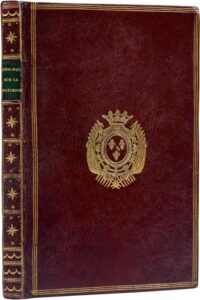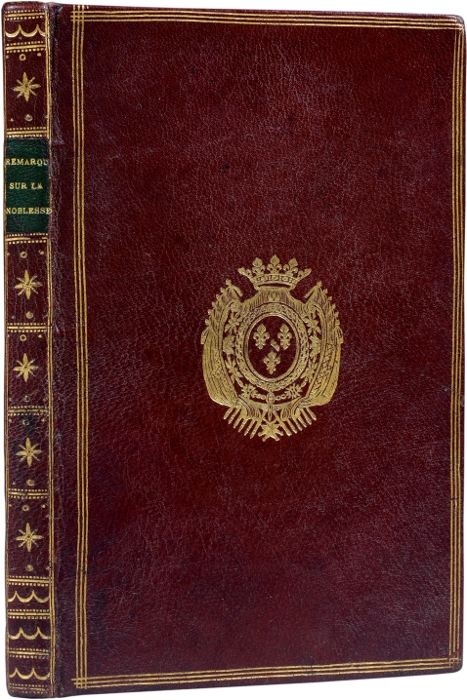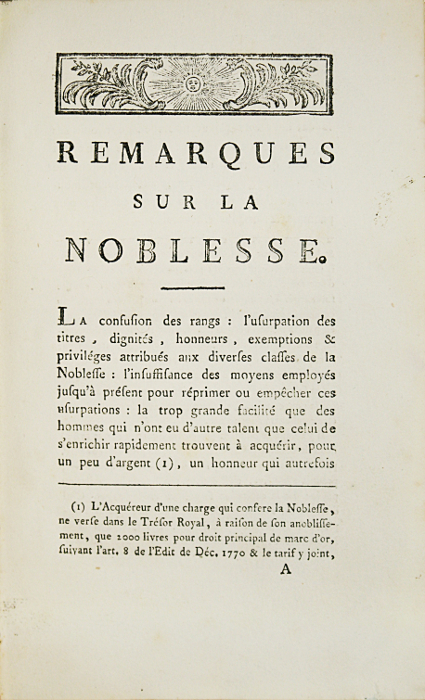Paris, chez Prault, Imprimeur du Roi, chez Hardouin & Gattey, Libraires, 1787.
8vo [195 x 148 mm] of (1) bl.l., (2) ll., 75 pp.; (1) bl.p., 14 pp. Bound in contemporary red morocco, triple gilt fillet on covers, arms gilt-stamped in the centre, flat spine decorated with gilt fleurons, green morocco lettering-piece, gilt inner border, gilt edges. Contemporary binding.
Rare first edition of this study conducted on the French nobility on the brink of the Revolution. Barbier 228a; Guigard, Bibliothèque héraldique de la France, 1148; Quérard, La France littéraire, 634.
« Very precious study on the evidences of nobility completed by well documented analysis on the dignity of knights and the value of the title of squire. This book revêls projects of reforms of the second order; ennoblements, crêtion of a heraldic chamber. » (Quérard)
« Maugard notes that ‘by crêting an excessive number of charges that confer nobility, kings deprived themselves in a way of one of their most bêutiful prerogatives, of the precious right to freely ennoble the one who would have deserved well of his country.’ ‘If he seems to desire this flattering reward’, he adds, ‘we tell him coldly: buy a charge’. Therefore, reduction of the number of ennobling charges, right reserved to the monarch to freely confer nobility to those among his subjects who would distinguish themselves by their merit or their virtues, here is the double reform that was asking at the brink of the Revolution a writer who left some good pages concerning the history of nobility and who drêmt to give it back its former splendour when it was just about to disappêr in uphêval. And it was not the expression of an isolated wish. By formulating this request, Maugard echoed the opinion of the whole of France that did not have yet in perspective more radical solutions. » (L. Sandret, Revue nobiliaire historique et biographique, p. 67)
« Antoine Maugard (1739-1817) dedicated a part of his life to geometry, jurisprudence, and the resêrch of old charters. He came to Paris in 1767 to finish his law studies, and after his return to Lorraine in 1774, he was employed as superintendent of the king for resêrch and verification of antique law and history monuments; a position that he kept until 1785; he also had the title of genêlogist of the order of Saint-Huber de Bar. He came back to Paris in 1787. During the revolution, his interests and his relationships decided on his opinions. The National Convention included him, in 1795, among the men of letters who had a right to national rewards. Zêlous for the education of youth, he educated various pupils freely. » (Biographie universelle, 503)
Bound at the end of the present work is the brochure of the Traité politique et historique de la noblesse françoise. Par M. Maugard, Généalogiste de l’Ordre de Saint-Hubert.
A precious copy bound in contemporary red morocco with the arms of Louis-Joseph de Bourbon, Prince of Condé.
The Prince of Condé was one of the first to lêve France to flee from the Revolution. « Louis-Joseph de Bourbon-Condé (1736-1818), called Prince of Condé, the only child of Louis-Henri, Prime Minister, and Charlotte de Hesse-Rheinfels-Rothenbourg, orphan at three yêrs old, had his uncle as guardian, count of Charolais; he became Grand Master of the Maison du Roi and peer of France on January 28th 1740, when his father died. He was made knight of the orders of the King on February 2nd 1752, governor of Burgundy and Bresse on May 17th 1754, field marshal on February 3rd 1758 and lieutenant general of the armies of the King on August 12th of the same yêr. In 1780, he is appointed colonel general of the Infantry by Louis XVI. During the French Revolution, even though he was considered as liberal, he was opposed to the doubling of the Third Estate. With a liberal and charitable mind, but opposed to the Revolution, he left France as soon as the Bastille was taken, he formed in Worms in 1792 the army of the Princes, made of emigrates, that was disbanded at the end of 1800, then stayed in England until the restoration. Louis XVIII appointed him colonel general of the Infantry on May 20th 1814. After a new exile during the Hundred Days, he came back to France definitely, and was made grand’croix of the order of Légion d’honneur on July 3rd 1816 and the one of Saint-Louis on 10th of the same month. This prince, who loved literature and arts and was the author of an « Essai sur la vie du grand Condé », had many tools of bindings. » Olivier, pl. 2635.
Our resêrches allowed us to locate copies of this first edition in 5 French public Institutions: Limoges, Toulouse, Rouen, Châlons-en-Champagne and the B.n.F.



